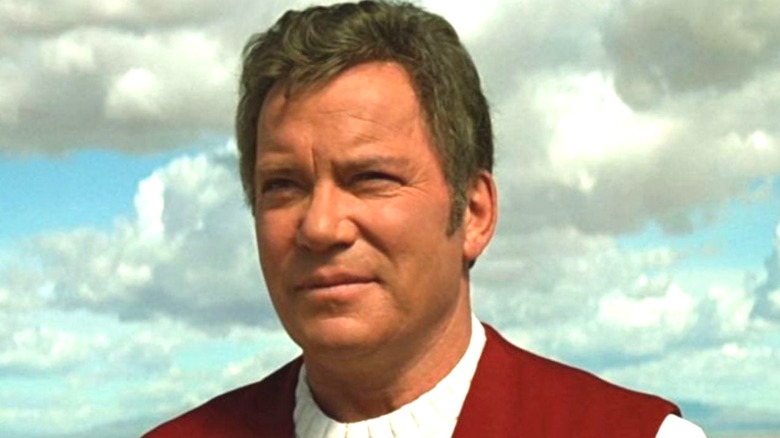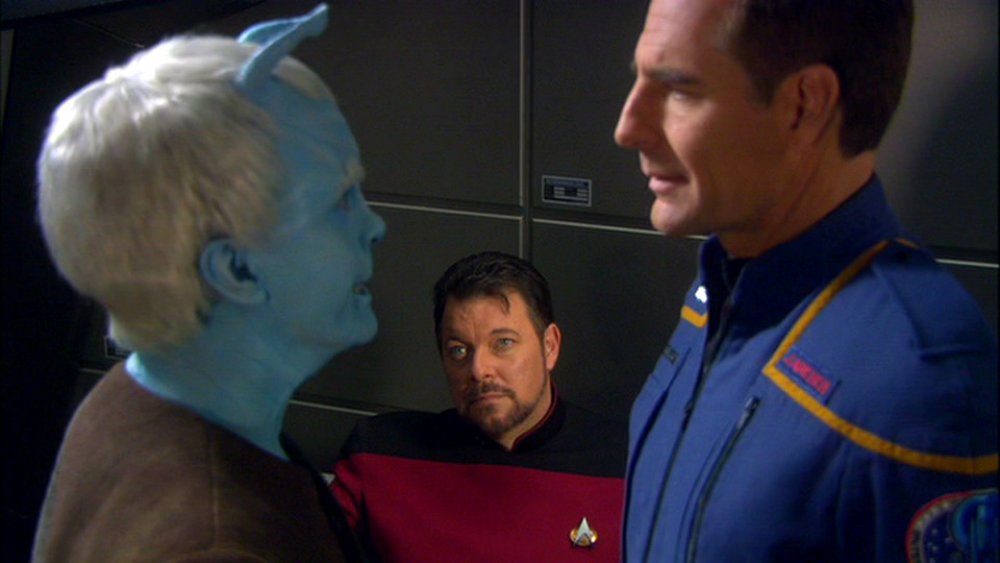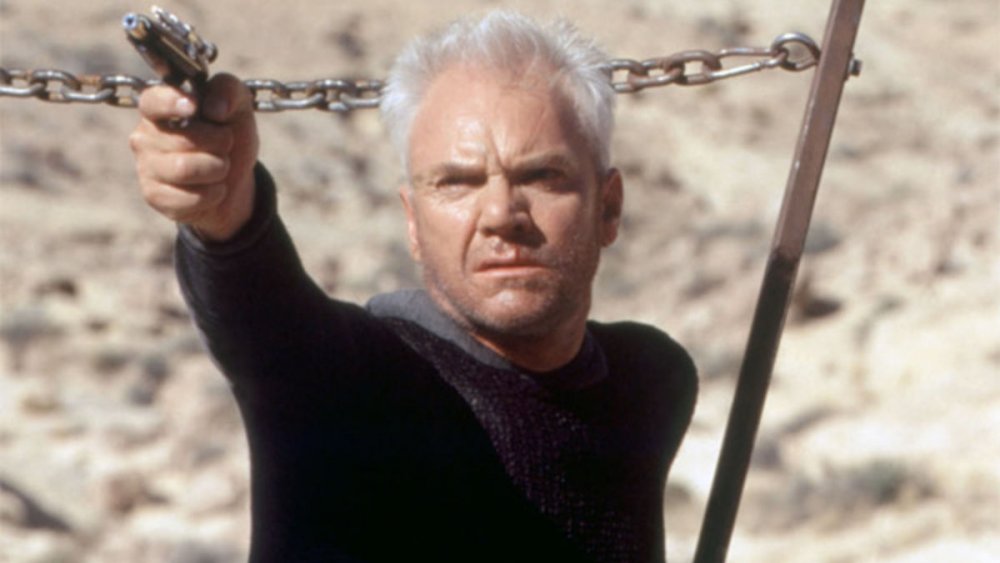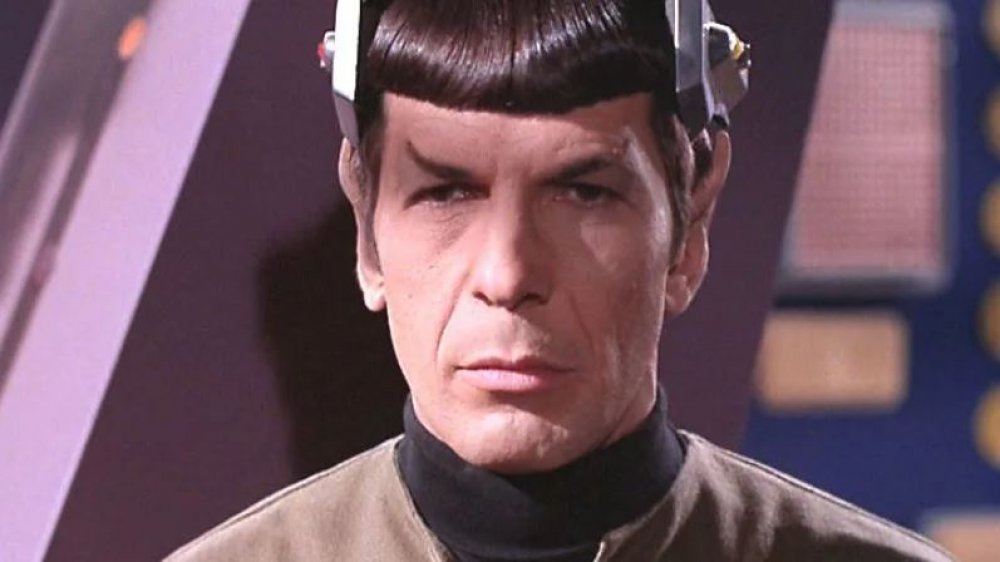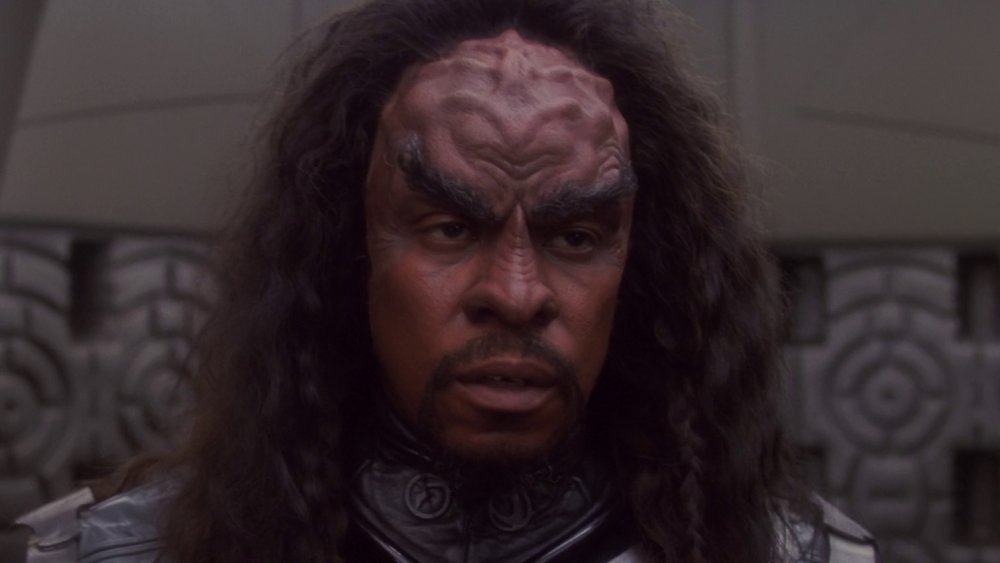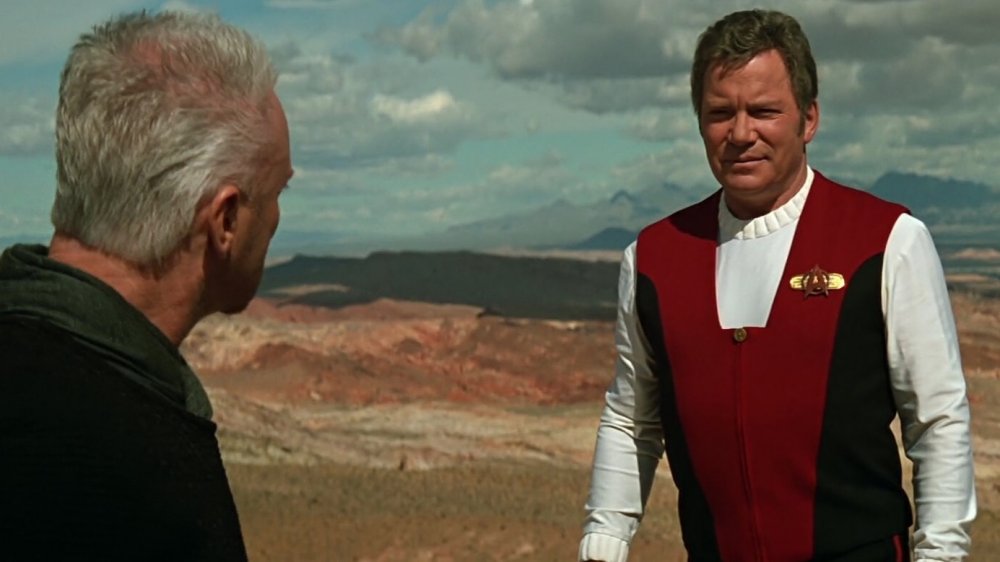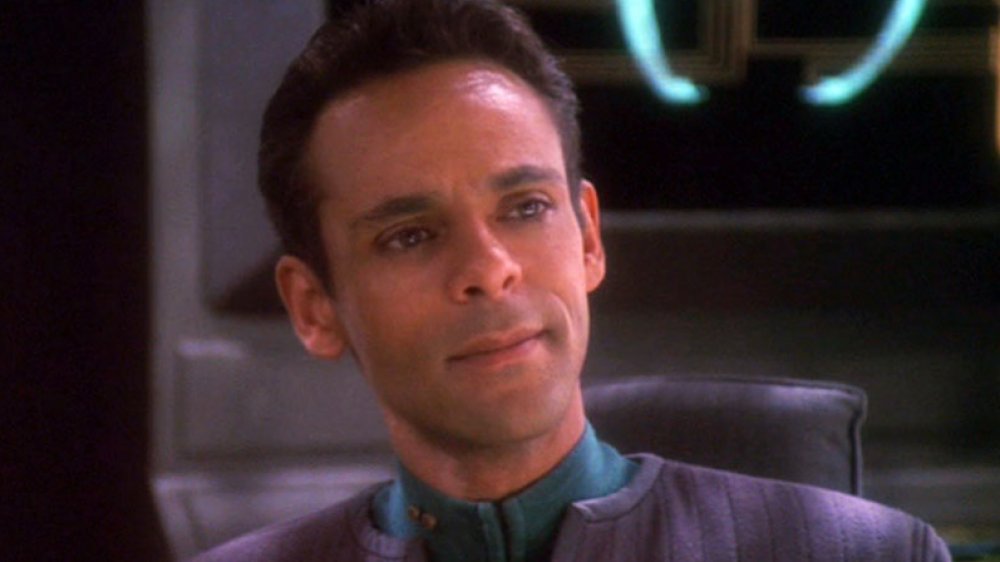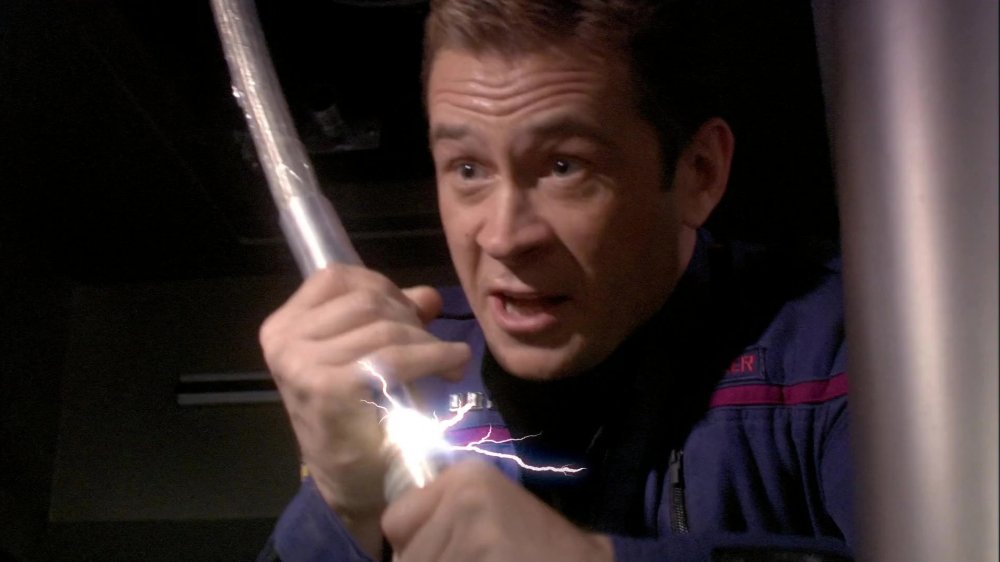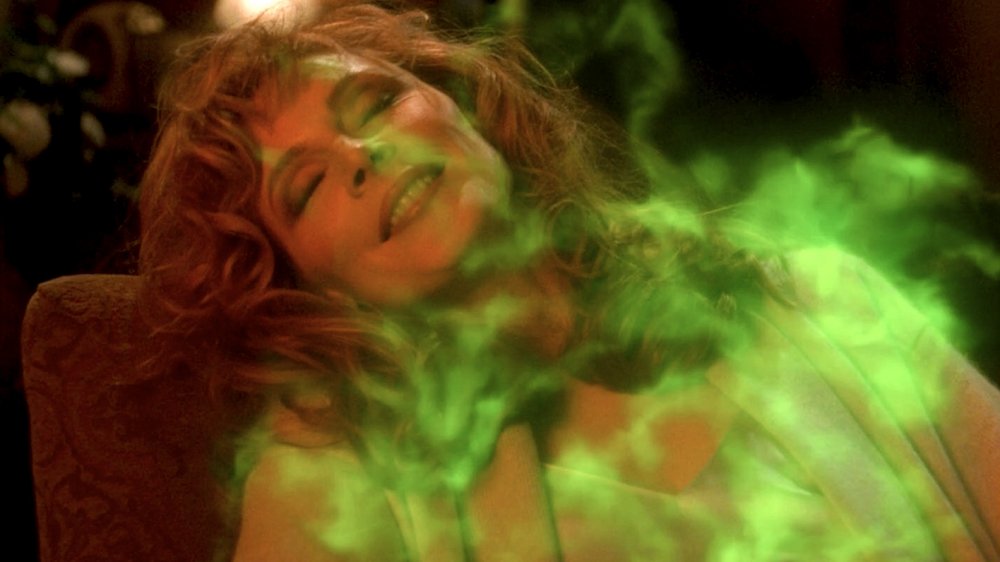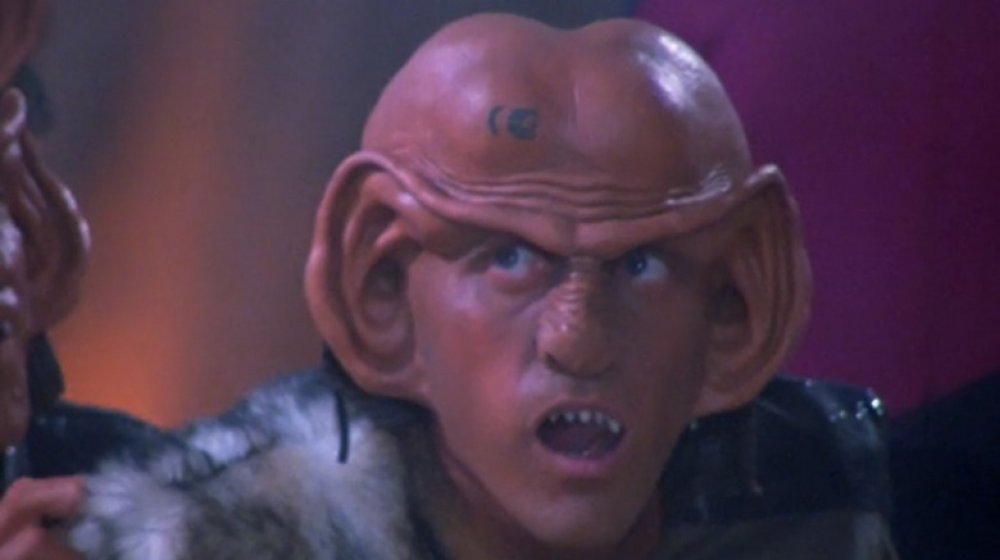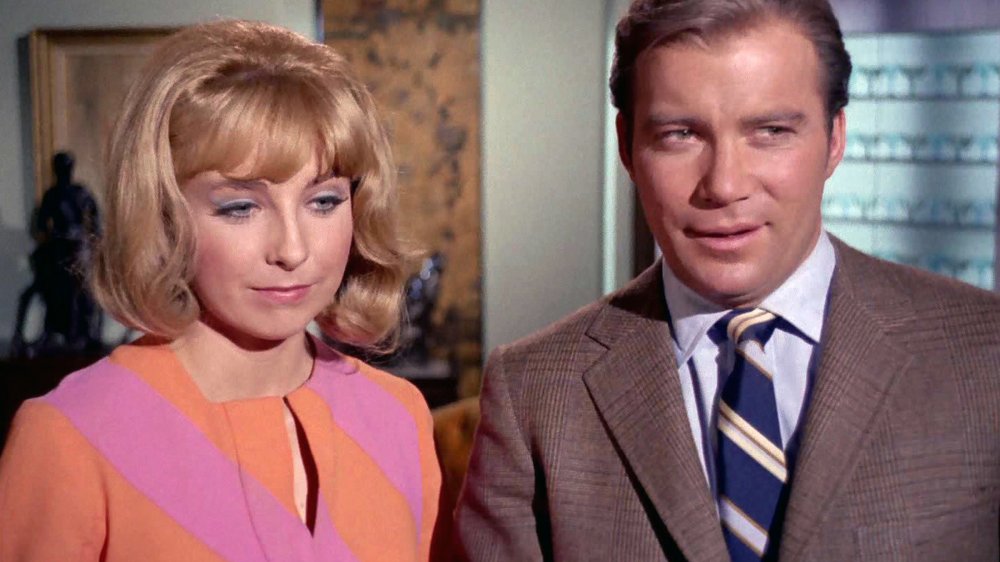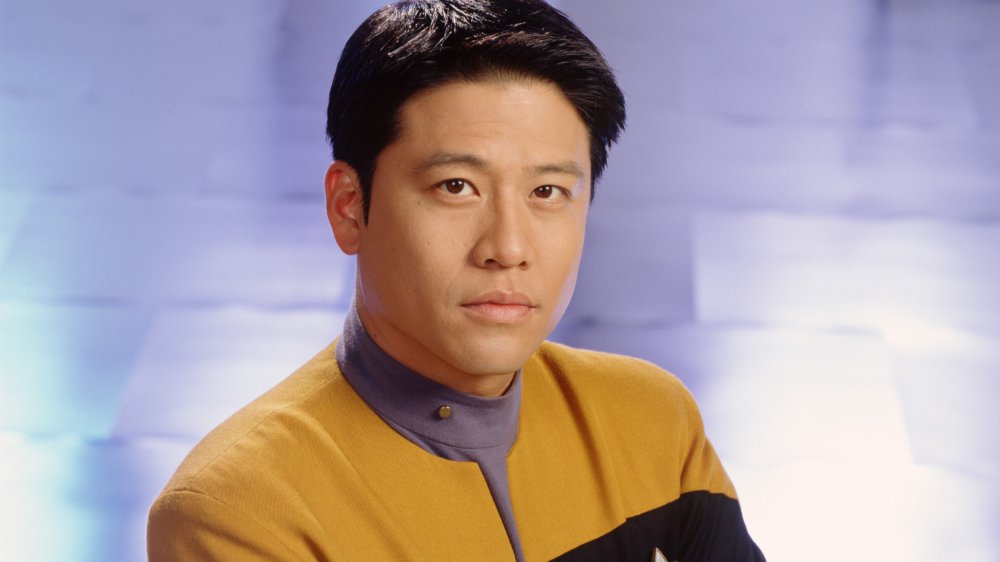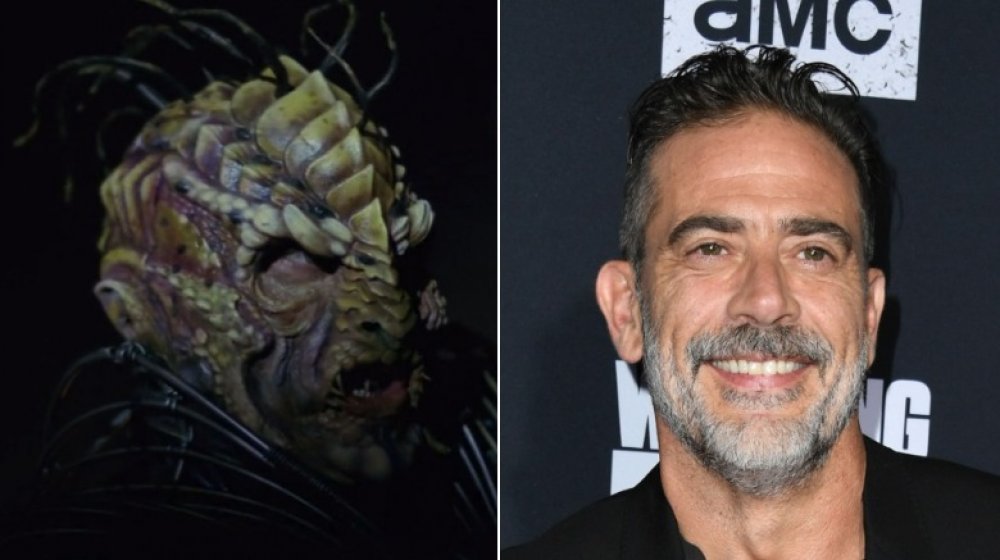Scenes Star Trek Actors Regret Filming
Star Trek can tell us wonderful things about the human condition. It can also be deeply, deeply embarrassing for both fans and the cast. On sheer volume alone, it makes sense that many episodes would be mediocre to bad, but some transcend that. Some caused the actors to silently protest. Others made the cast worry that they'd never live it down. And many are ones that all parties involved — cast, crew, producers, and fans — wish they could forget.
Though cast members may be reluctant to badmouth the show that's paid their bills for years, a few have talked about the Star Trek moments that evoke shame or confusion. A few were only there for a movie or even just one episode. Many others are lifers almost synonymous with the franchise. And thanks to the relentlessness fanbase, the convention scene, and intrepid journalists, we have answers to these shameful questions. Here are scenes that the Star Trek actors regret filming.
Jonathan Frakes truly regrets that Enterprise finale
Few people have been in more Star Trek projects than Jonathan Frakes as William Riker. This means, despite all the wonderful memories, the actor remembers a whole lot of bad moments. After all, Riker has many an ignoble scene, from becoming a himbo in the Next Generation episode "Angel One" to his time seducing the Space Irish in "Up the Long Ladder." Frakes himself called "Code of Honor" a "horrible racist episode" and allegedly tried to get it pulled from syndication.
However, the scenes he regrets the most aren't in The Next Generation. Instead, they come in his one-episode appearance in Enterprise, where he provided the framing story for the series finale "These Are The Voyages." He's admitted that his presence was a disservice to the regular cast of the show, as Riker permeates the episode, appearing at dramatic times that should belong to other characters. For example, when Trip is dying, the camera keeps panning to Riker, who's watching in the background. Even the last line of dialogue in the entire series is spoken by Riker — not Archer, not Tucker, not even T'Pol ... but Riker.
Frakes has called it an "unpleasant memory." Sure, he was delighted to work with Marina Sirtis again, but that was a small consolation for an awkward situation. "They said it would be a Valentine to the fans," Frakes said (via High-Def Digest), "but all of it ended up doing I think was hurting Scott Bakula's feelings." Bakula himself has never spoken about the finale, but writer/producer Brannon Braga called it "the only time Scott Bakula was ever mean to me," so tensions were there.
Malcolm McDowell isn't crazy about Kirk's death scene
Malcolm McDowell played one of the most important villains in Star Trek history. As Dr. Tolian Sora in Star Trek: Generations, he was the force that united Jean-Luc Picard and James T. Kirk. He was also the man who, via weird bridge collapse, killed William Shatner's beloved character. While McDowell relishes being known as "the man who killed Kirk," he regrets how the scene went down.
In an interview with StarTrek.com in 2011, McDowell was asked what he thought about Kirk's death. He did not hold back. "If you have – which they had – this icon of American television, why the hell didn't they give him a spectacular death? Why did they give him such a really paltry death? Me shooting the bridge out or some BS whatever it was? They should have sent him off in a glorious fashion, and they didn't."
The scene originally had Soran shoot Kirk in the back before reshoots. McDowell also found this disappointing, and he lamented that they couldn't "have seen Shatner off in a big way." More than anything, he considers it a wasted opportunity. As he explained to Metro (via io9), "It was feeble, I thought, because I thought he deserved better."
Leonard Nimoy was embarrassed during this Star Trek episode
As Spock, Leonard Nimoy was there for many of Star Trek's greatest moments. It's easy to picture him performing a Vulcan nerve pinch or explaining how the needs of the many outweigh the needs of the few. But he was also front and center for one of Trek's worst hours, "Spock's Brain," an episode that was deeply embarrassing for him.
Though it aired a half century ago, perhaps no episode has come to symbolize Trek at its worst more than "Spock's Brain." The episode sees Spock's brain surgically removed and kidnapped by an alien species. Vulcan physiology lets their bodies stay alive for 24 hours without a brain, so Kirk goes hunting for it. Even for '60s sci-fi, that was a bridge too far.
In his autobiography I Am Spock, Nimoy singled it out as a particularly painful memory. "Frankly, during the entire shooting of that episode, I was embarrassed, a feeling that overcame me many times during the final season of Star Trek." It's worth noting that the final season also includes Spock jamming with space hippies, which he's never mentioned, but it isn't one of his finer moments, either.
There are two Star Trek moments that make Avery Brooks cringe
Though Deep Space Nine is considered the gritty Star Trek, it still had a fair number of foolish moments. These even included some from no-nonsense Benjamin Sisko. When asked what his least favorite scenes were, Avery Brooks said it was a tossup between two choices.
The first was in "Move Along Home," specifically the scene in which he and his crew had to sing a song and play space hopscotch to get past a door. "There's nothing wrong with the melody," he said. "It's the hopscotch part." He knew right away that he'd never live it down and jokingly said he's glad he didn't go home to Gary, Indiana, right after that.
The second was "Apocalypse Rising," in which he played a Klingon. This involved enough prosthetics that it necessitated a dentist appointment. But while he didn't want to do it, Brooks had no choice — it was "pay or play" — but he wants fans to know that he didn't like it. As he put it, "The resistance you observe with Sisko playing a Klingon was real."
William Shatner has some strong opinions about Kirk's farewell
William Shatner has spent more time than anyone as the face of Star Trek. And when you're the head honcho of the USS Enterprise, this comes with many great moments, but it also comes with many deeply embarrassing ones. Some of these were a product of the time period. Others were a product of Shatner's own ego. But the scene he publicly regrets most is his final scene.
Star Trek: Generations ends with Captain Kirk's death, one that never quite sat right with fans. It never quite sat right with Shatner, either. When asked by Crave Online whether he was satisfied with Kirk's death in Star Trek: Generations, Shatner said, "No, no, I would have done something else."
According to Shatner, the suits at Paramount figured the Star Trek franchise might make a lot more money (hopefully $200 million) if they included the Next Generation cast. They also allegedly reasoned that there wasn't much milk left in the Original Series cash cow. So it was a perfect time for Kirk to meet Picard. However, the filmmakers also realized they needed to up the stakes by killing off a character in Generations. And specifically, they wanted to kill James T. Kirk.
So as Shatner explained to TrekMovie.com, he was presented with two options. "It was either I was going to appear and die, or they were going to say he died. So, I chose the more practical of the two." This led to his ultimately unremarkable death scene, where his death is less "noble sacrifice" and more "bridge collapse."
Between the lackluster box office — which hit $118 million, meaning they didn't even break their ceiling — and the pathetic death, Shatner wasn't happy. "I wish," he said, "that there had been more trumpets for the death of the character.
Alexander Siddig absolutely hated a certain DS9 storyline
Dr. Julian Bashir received some backlash during Deep Space Nine's early days. He was seen as boring, brash, and worst of all, kind of annoying. But while the producers had a plan to make him more interesting, this blindsided actor Siddig El Fadil, who now goes by Alexander Siddig. It started a storyline that he had no say in and wanted no part of, and in fact, he eventually forced the regretful storyline to stop.
"Dr. Bashir, I Presume?" reveals that Bashir was genetically modified as a child, which made him much smarter. But Siddig didn't learn about this plot development until the day before shooting. He was upset that the producers wouldn't go over a major character arc with the actor actually playing the character. This was, in his estimation, a response to the character's unpopularity and an attempt to turn him into another Data.
"I did it the only way that an actor can," he said to TrekMovie.com, when asked how he coped. "I completely destroyed the lines that they gave me regarding the situation." He tanked the storyline, putting no effort into it. One time he "pinned the lines to the back of someone's shoulders" to read them. He also "pinned them around the office as if they were lines needed for daily modification." The producers eventually got the literal and figurative memo, and the story was phased out.
Connor Trinneer majorly regrets his death scene
Though Enterprise is by and large considered a malign part of Trek's history, fans still have an affection for it. And few characters from the series get more love than Trip Tucker, played by Connor Trinneer. Tucker was front and center for some of the show's best moments, such as dealing with the ethics of cloning in "Similitude," captaining the ship in "Twilight," and getting pregnant in "Unexpected."
He was also there for one of the franchise's worst hours, Enterprise's finale, which specifically included his pointless death. And it's been a source of frustration, if not regret.
Trinneer has the same criticisms of "These Are The Voyages" that most fans do. By including characters from The Next Generation, it did a disservice to the Enterprise crew. While it was nice to see Riker and Troi, it meant that the finale was just another TNG episode.
More importantly, Trinneer hates the way Tucker died, nearly blowing himself up to ward off exactly two attackers. He found the death arbitrary and rash, telling Trek Today, "I've gotten out of much worse scrapes than that." Trinneer does count himself as lucky in one way, though — at least he got an ending. As he explained to TV Guide, "I'm the only one who went out with a bang ... no pun intended. I got the goodbye no one else did."
Gates McFadden can't stand that Star Trek episode with the lamp
Every crew member on The Next Generation had a skeptical streak, but few were more grounded than Dr. Beverly Crusher. Spending six seasons as the chief medical officer of the Enterprise demands it. But there's also actress Gates McFadden, who to this day is baffled by what the writers were thinking when they gave her "Sub Rosa."
"Sub Rosa" is often listed as one of the worst episodes of The Next Generation. An attempt at Gothic romance in space, the story — in somewhat reductive terms — involves Beverly falling in love with a ghost inhabiting a lamp. It's worth mentioning that this lamp ghost has also seduced several generations of her family.
As maligned as the episode is, criticism rarely falls to McFadden, who put on a particularly intimate performance without showing anything explicit. That's a credit to her as a performer, and content aside, the nature of the story gave the actress some enthusiasm. She called it "thrilling" to be "outside her uniform" and perform in a more creative way.
Nonetheless, she found the whole concept absurd. The script was written by Jeri Taylor, who some cast members credit with improving the writing for female characters. That seems to have made it more confusing for McFadden. As she explained at the 2012 Austin Comic-Con, "I was reading this, going, 'This woman became a doctor, and she's in love with a lamp?'"
Armin Shimerman regrets the first time he played a Ferengi
Armin Shimerman is best known as Quark on Deep Space Nine. But years before DS9 was even conceived, he had a part as a Ferengi on The Next Generation. And not just any Ferengi, either, but one of the first ones ever put to screen.
He regrets every second of it.
Star Trek creator Gene Roddenberry imagined the Ferengi as the main antagonists for TNG. They were introduced in "The Last Outpost," just a few episodes into the new series. The Ferengi were meant to be menacing, threatening, and anything but funny. Nonetheless, they came across as comical, and the episode is held in low regard to this day. Their credibility as villains tanked, and they were mostly comic relief until Deep Space Nine. Shimerman blamed himself, telling Gamespot that he "failed miserably" and that "no one one bears the brunt of that mistake more than I do."
So Shimmeman approached Quark as an attempt to salvage the Ferengi. "All of my work on Deep Space Nine, for the first four seasons, was me trying to eradicate that original performance from everyone's mind."
Teri Garr doesn't like talking about her Star Trek appearance
One of the all-time comedic actresses, Teri Garr has played in classics like Tootsie, Young Frankenstein, and After Hours. She also played Roberta Lincoln in "Assignment: Earth," the season two finale of The Original Series. It was one of her first speaking parts, and she later credited it in her autobiography with getting her real roles. That doesn't mean she likes it or even wants to talk about it.
Gene Roddenberry intended "Assignment: Earth" as a backdoor pilot to a new series, hedging his bets in case Star Trek got canceled. Ultimately, Star Trek got a third season, and "Assignment: Earth" remained a standalone episode. But years later, when interviewed for Starlog magazine, Garr expressed resentment towards the role. "I did that years ago," she said, "and I mostly deny I ever did it."
Garr is cagey about why it was a negative experience. Part of it likely had to do with Roddenberry, who was especially hands-on in hoping this would get picked up as a pilot. Producer Bob Justman, in his book Inside Star Trek, theorized that a costuming incident may have played a part. Roddenberry allegedly wanted Garr's skirt shortened to be more revealing.
Whatever happened, it was enough to sour her on the whole franchise and fanbase. She was glad "Assignment: Earth" never launched, saying, "Otherwise, all I would get would be Star Trek questions for the rest of my natural life — and probably my unnatural life. You ever see those people who are Star Trek fans? The same people who go to swap meets."
Garrett Wang has regrets about what could've been
Garrett Wang doesn't openly regret many scenes he played as Ensign Harry Kim. Rather, he regrets the scenes he didn't get to play — namely, any as a senior officer.
Wang still takes umbrage with the fact that Harry remained an ensign throughout Star Trek: Voyager. "I mean, come on people!" he said to StarTrek.com. "Kim was probed, beaten, tortured and held the distinction of being the first Voyager crew member to die and come back to life. What more does a guy have to do to get promoted to lieutenant for frak's sake?" This was made worse by the fact that Tuvok and Tom Paris were both promoted during the series, despite being members of the Maquis.
Wang called writer/producer Brannon Braga during the fourth season to ask why Harry hadn't been promoted. He was told, "Well, somebody's gotta be the ensign." He became so frustrated by this that he even appealed to Kate Mulgrew, Captain Janeway herself, about it. He finds this hilarious in hindsight.
He also regrets that he was never given a chance to direct an episode, saying that he's the first Trek cast member to be outright denied a chance to step behind the camera. Wang thinks the most likely reason for this was an off-the-record comment he made to TV Guide early in the series where he complained that human characters weren't allowed to show emotion.
Jeffrey Dean Morgan didn't enjoy his time on Star Trek: Enterprise
Hold up, Jeffrey Dean Morgan was in Star Trek? Yup! He appeared as a Xindi-Reptilian in the Enterprise episode "Carpenter Street." You'd be forgiven for missing him behind all the makeup. He'd also prefer you forget about the role entirely.
Circa 2003, Morgan's career wasn't doing so well. He wasn't in a position to turn down work, so he took a role in Enterprise. Little did he know that later he'd consider this his career low point.
Morgan expected some to do some line readings. He didn't expect four hours in a makeup chair over ten days. "I remember them dripping goop on my face," he told Entertainment Weekly, "and I had straws sticking out of my nose. I couldn't eat lunch. I was claustrophobic. I'd go home in tears." The whole process was so miserable he almost quit acting.
He's not entirely cynical about it, though. He acknowledged that "work begets work," and it helped him pay some bills. A job's a job, and without it we'd probably never meet Negan. That doesn't mean he had to like it, though.
